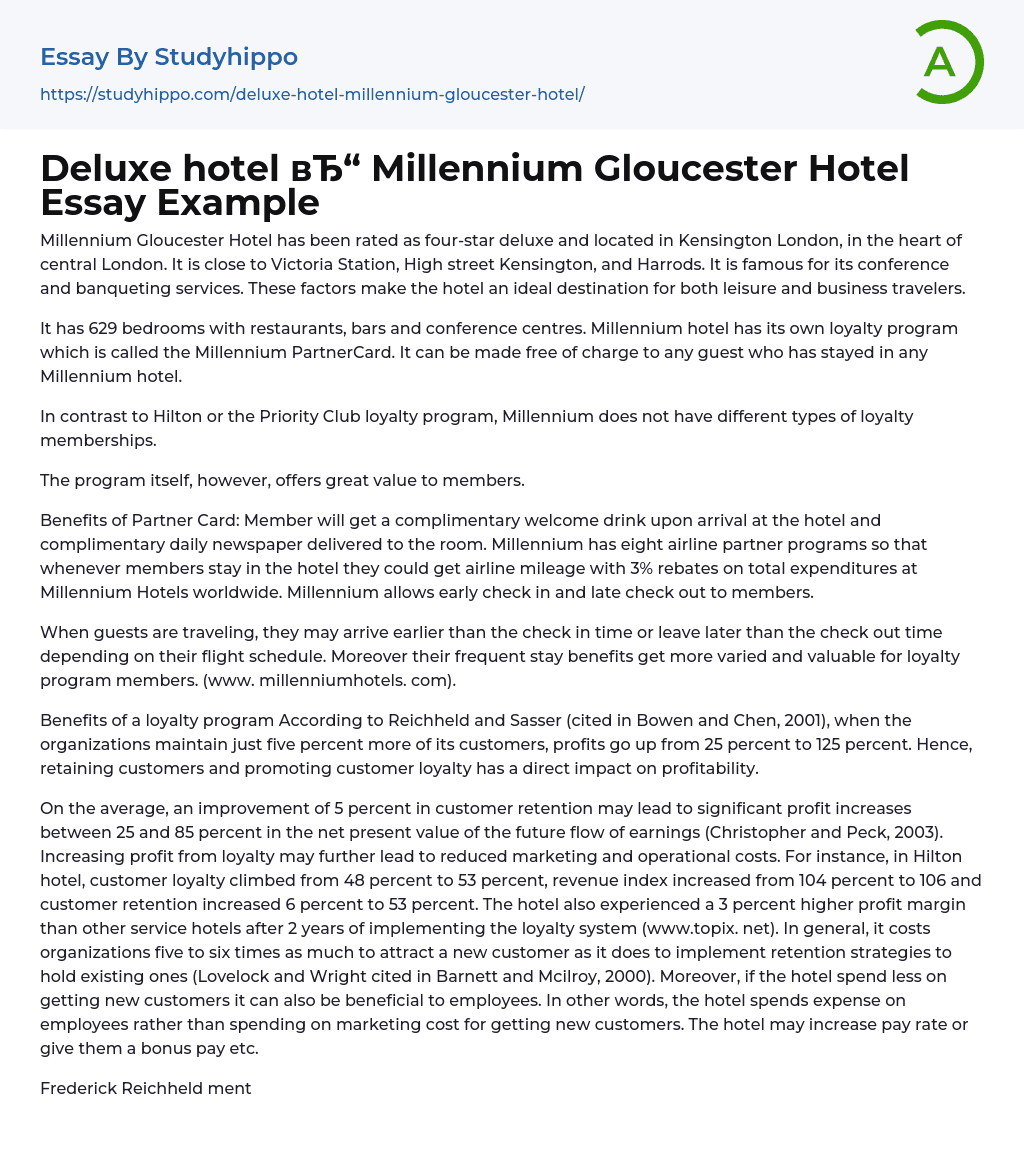Located in London's Kensington neighborhood, the Millennium Gloucester Hotel is a luxurious four-star hotel with exceptional conference and banqueting amenities. Its prime location near Harrods, High Street Kensington, and Victoria Station make it an ideal choice for both business and leisure travelers.
Millennium's loyalty program differs from Hilton and the Priority Club in that it does not have multiple tiers for membership.
For travelers, it is common to arrive early or depart late from the hotel due to their flight schedules. Moreover, loyalty program members can receive exclusive and valuable perks during their frequent visits. Visit www.millenniumhotels.com for more information.
On average, a 5 percent increase in customer retention may result in significant profit growth ranging from 25 to 85 percent in the net prese
...nt value of future earnings (Christopher and Peck, 2003). Increased profits from loyalty can also translate to lowered marketing and operational costs. For example, at Hilton hotel, customer loyalty went up from 48 percent to 53 percent, revenue index rose from 104 percent to 106 percent, and customer retention rose from 6 percent to 53 percent. The hotel also reported a three percent higher profit margin than other service hotels after implementing the loyalty program for two years (www.topix.net). Generally, organizations incur five to six times greater expenses to attract new customers compared to implementing retention strategies for existing ones (Lovelock and Wright cited in Barnett and Mcilroy, 2000). Furthermore, by spending less on attracting new customers, hotels may benefit their employees. In other words, instead of spending on marketing costs for acquiring new customers, hotels can allocate more towards their employees' pay rates or bonuses.
<
style="text-align: justify;">Lowering the rate of employee turnover has the potential to result in greater productivity, decreased expenses for training, and possible advantages in customer spending due to loyalty based on recognition and trust of the company.
Scholars have emphasized the importance of word of mouth for businesses. According to McColl-Kennedy (2003), receiving information about a product or service from friends and family can provide customers with accurate information and help reduce discrepancies between expectations and actual service. Silverman (2002) emphasizes that word of mouth has a significant impact on marketing, being more powerful than traditional advertising. Additionally, Bowen and Chen (2001) highlight Raman's (1999) research on loyal customers who recommend companies and spread positive word of mouth.
The hotel industry considers loyal customers as valuable assets and service organisations rely on customer loyalty to set themselves apart from competitors, resulting in potential cost savings such as reduced marketing expenses. However, there are concerns regarding the execution of loyalty programs.
The evolving demands of people's sophisticated lifestyles require hotels to keep up-to-date with their customers' current needs, such as wireless internet which has become an important factor for business travelers when choosing accommodation. In order to satisfy customers and maintain loyalty, hotels must meet these expectations within their loyalty program.
According to Chew and Wirtz (2002), word-of-mouth is viewed as a powerful communication tool that can have both positive and negative effects on organizations' interactions with potential customers. To generate positive word-of-mouth, organizations must provide extremely good, high-quality, and excellent service. Conversely, providing poor service or making mistakes when serving loyal customers could result in negative word-of-mouth. Nonetheless, even if customers
receive good service, they may not necessarily share their satisfying experiences with others.
Negative feedback is deemed to have greater impact than positive remarks, as per some authors. Its effect also intensifies with time, which can lead to a tarnished reputation and reduced profits for businesses. Moreover, Divett, Crittenden and Henderson (2003) cite studies that suggest loyalty cards can be misleading.
Despite the considerable resources devoted by organizations to loyalty programs, there is no assurance that these initiatives will yield successful outcomes in fostering customer loyalty. The efficacy of these programs in forging enduring bonds between customers and firms, or in appealing to both potential and repeat customers to sustain engagement with products and services, remains a matter of contention. This raises the fundamental question about the worthiness of pursuing such marketing strategies, and whether they are merely viable in theory.
- Commercial Bank essays
- Debit Card essays
- Deposit Account essays
- Subprime Lending essays
- Chief Executive Officer essays
- Convenience Store essays
- Firm essays
- Training And Development essays
- Unilever essays
- Variable Cost essays
- Virgin Group essays
- Bargaining essays
- Entity essays
- Pest analysis essays
- Motel essays
- Advertising essays
- Audience Theory essays
- Competitor Analysis essays
- Consumer essays
- Marketing Management essays
- Marketing Mix essays
- Marketing Plan essays
- Marketing Research essays
- Marketing Strategy essays
- Point Of Sale essays
- Price essays
- Procurement essays
- Product essays
- Product Differentiation essays
- Promotion essays
- Promotion And Marketing Communications essays
- Retailing essays
- Trademark essays
- Anheuser-busch essays
- Brands essays
- Detergent essays
- Product Placement essays
- Research Design essays
- New Product Development essays
- Advertisement essays
- Brand essays
- Sales Promotion essays
- Advertising campaign essays
- Consumer behaviour essays
- Offer And Acceptance essays
- Wal-Mart essays
- Discover essays
- Bank essays
- Banking essays
- Corporate Finance essays




